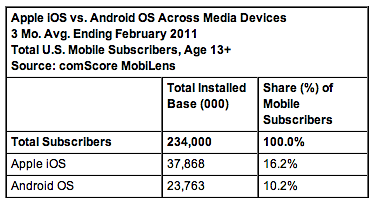Apple's iOS crushes Android's mobile platform reach

"Blah, blah, blah" is the sound of analysts, bloggers and reporters sounding off about how Android handsets outsell iPhone -- true Google's OS is like Pac-Man gobbling smartphone market share. But cell phones are but one category among several vying to become the PC's platform successor. By that measure, at least in the United States, iOS' reach exceeds Android's by more than 59 percent, according to ComScore on "connected media devices" -- what I have longed called cloud-connected mobile devices.
ComScore measured the U.S. "unduplicated" install base of Android and iOS devices -- 23.8 million and 37.9 million, respectively. Apple claims to have shipped more than 100 million iOS devices -- iPads, iPhones and iPod touches -- but that's globally, and not all may still be in use. Assuming ComScore's methodology is accurate, install base is a good measure.
"These data clearly illustrate the Apple ecosystem extends far beyond the iPhone," Mark Donovan, comScore senior vice president of mobile, says in a statement. That finding is hugely important for Apple building out iOS as a broadly appealing platform for consumers (or businesses) to buy into and developers to create applications for.
"Though it's frequently assumed that the Apple user base is composed of dedicated Apple 'fanboys,' there's not a tremendous amount of overlapping mobile device access among these users," Donovan adds. Surprisingly, ComScore found that only 4 million people with access to iOS -- that's 10.5 percent -- use more than one device running the platform. "This of course has significant implications for the developer community as they consider the market potential in developing applications for different mobile platforms," Donovan emphasizes.
The significance is two-edged. For developers, ComScore's findings suggest that the iOS platform has broad consumer appeal -- that the market isn't just a bunch of Mac wonks. However, the data also suggests there is not much device overlap, which negates theories about "halo" sales where iPhone owners buy iPad or visa versa. Based on my trips to local Apple Stores here in San Diego, the little overlap scenario is tough to believe. I've observed hundreds of iPhone users buying iPads, for example.
My observations sync with other ComScore data. The analyst firm found that 27.3 percent of iPhone users own iPads. By comparison, 17.5 percent of BlackBerry users and 14.3 percent of Samsung smartphone owners have iPads.
Looking at ComScore's data differently than presented in its release, there is a strong correlation between smartphone and iPad ownership. For example, 47.3 percent of iPad owners are ages 25-44. Among the same age segment, 49.5 percent also have smartphones. Among 13-24 year olds, 22.8 percent have iPads and 23.3 percent have smartphones.
Despite ComScore's using its data to dispel any Apple fanboy myths, the strong correlation between smartphones and iPads shows the broader platform potential -- if Apple and its developers provide a compelling experience among iOS devices.
In October 2009, I asserted that "Apple cannot win the smartphone wars," which clearly is evident now with Android's huge sales surge during 2010. However, as I wrote in August last year: "Apple can still win the mobile platform wars, but it won't be easy." As I explained then:
Competition may be just what Apple needs to stay the course and navigate past pirates looking to snatch its mobile platform booty. From a purely platform perspective, iOS is the most appealing choice. Developers get a single ecommerce-capable platform for their applications, and consumers (or businesses) get mobile products developed end-to-end from one company. Applications can run across iPad, iPhone and iPod touch, too -- another compelling benefit. However, Google is building the stronger, sustainable ecosystem around a mobile operating system. Google's only big problem is fragmentation.
If anything, Android fragmentation is worse now than last summer, with different versions for smartphones (2.x) and tablets (3.x). Still, Google is activating 350,000 Android handsets per day -- that's 31.5 million per quarter, or nearly twice as many iPhones as Wall Street analysts predict for Apple's fiscal 2011 second quarter (the company announces earnings tomorrow).
For now, Apple has a clear platform reach lead -- in the United States, at least -- and that means we'll be hearing "blah, blah, blah" from the Apple fan club of analysts, bloggers and reporters in praise of iOS for the rest of the week (I only opened with Android fan club "blah, blah, blah" to raise your blood pressure).
Quick question: Do you own iPad and iPhone? Please answer in comments and explain why you have two (or, gasp, more) iOS devices.
